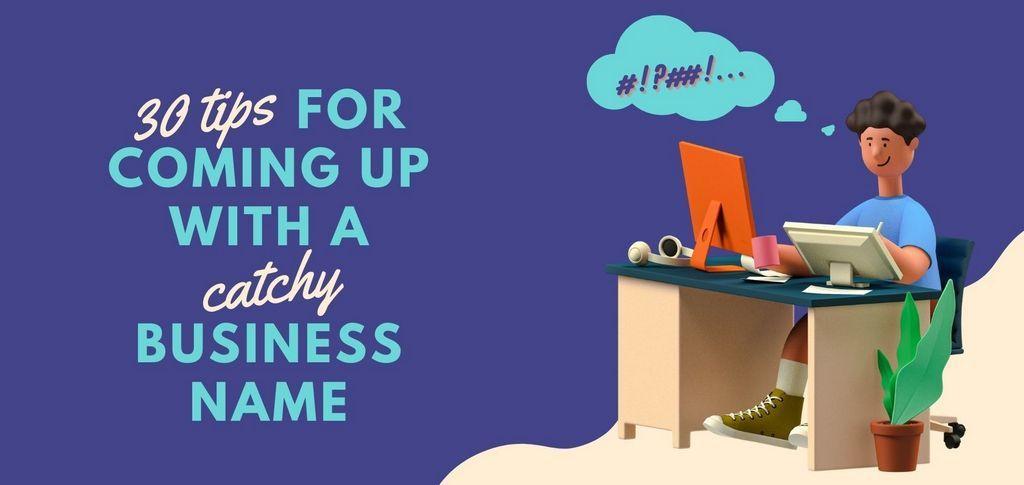Coming up with a catchy business name can be challenging. You want something that sounds good, is easy to remember and will stand out from the competition.

Many entrepreneurs know the importance of having an appealing company name. A lot of them struggle with coming up with one because they want something original and unique but not clichéd. The importance of a catchy name can be seen in how it will make or break the business, so entrepreneurs need to come up with an idea that is both appealing as well as different from other businesses.
There are many benefits to this, such as it makes marketing easier because people will be more likely to remember the company. It also allows for less confusion and customers won’t need any additional information in order to find what they’re looking for. Furthermore, an appealing business name can help with branding by giving the company a personality.
You could pay a professional naming company to do it for you, but for a lot of businesses, this is simply not an option.
Don’t just yet start paying for a business name! Continue reading and get inspired by these 30 tips for coming up with a catchy business name:
- Brainstorm words and phrases
- Use acronyms
- Use an AI-powered generator
- KISS – keep it simple, stupid!
- Use a “catchy” word
- Consider the location
- Think about the future
- Use an inside joke
- Use puns and wordplay
- Avoid clichés
- Get inspiration from other companies
- Ask your friends and family
- Use a dictionary or thesaurus
- Think about what’s trendy
- Get feedback from your target audience
- Use rhyming words or phrases
- Use the Google Adwords Keyword Tool
- Get creative and think outside the box
- Run a contest with prizes for the best name. People will want to win!
- Make your name personal to you
- Combine two words
- Use alliteration
- Think about word associations
- Get inspiration from nature
- Use numbers
- Stay away from negative connotations
- Use a word that means something to you
- Change one letter in an existing word
- Use all five senses
- Get inspired by movies, books and TV shows
- Brainstorm words and phrases that are relevant to the business
Choosing a business name can be a daunting undertaking. A strong and captivating name is an important part of the success of any business. It is important to consider keywords and the potential for future branding when choosing a name.
Businesses often find it easier to create a name once they have a specific niche or product in mind. The process of coming up with a name involves brainstorming potential names and narrowing them down to the best ones. A great way to get inspiration for a name is to brainstorm words and phrases that are relevant to the business. One way to do this is by listing adjectives that describe the product or service that the business provides. For example, if the business is a photography company then words like “creative,” “artistic” and “original” might be good adjectives to list.
Another way of brainstorming names is by listing keywords that are relevant to the product or service provided by your business. For instance, for an art gallery, words like “paintings,” “artists” and “exhibitions.”
When narrowing down the list of potential names, it is important to consider how they will sound when said aloud. It is also important to consider how the name will look when written. A good idea would be to list potential names in alphabetical order so that it’s easier for people reading your brainstorming session notes later on, or if you want someone else (like an employee) who might not have been involved with the process to be able to come up with a name.
- Use acronyms
One way to come up with a catchy business name is by using acronyms. Acronyms are abbreviations that use the first letter of each word in a phrase. For example, NASA stands for National Aeronautics and Space Administration. Acronyms can be useful because they’re memorable and easy to say or spell out loud without having to write them down on paper every time you want to say them.
It is important to note that acronyms are often difficult for people who do not speak the language of origin, so they may not be the best choice for a business that wants to reach an international audience.
- Use an AI-powered name generator to find ideas
If you are struggling to come up with a catchy business name, it might be a good idea to use an AI-powered business name generator. A quick search on the internet will bring up plenty of tools that can help you come up with a business name, including companies like Copy.ai and Botowski who offer online generators for generating names based off keywords or phrases.
With these generators, you can type in a word or phrase and then click on the button to generate some suggestions. A good idea is to start with a word or phrase that relates to the type of business you are creating.
AI-powered name generators can be a helpful tool for brainstorming and coming up with the perfect business name. A clever name is a must. Amazing business names, only a click away.
A clever name is a must. Amazing business names, only a click away. - Keep it simple and memorable
Keep your business name simple and memorable. This will make it easier for people who want to remember the company’s new website or social media handle, as well as those who are searching on Google in order to find a particular product or service that you provide. You get bonus points if there is a story behind the name. A good example of this is the name “Red Bull” which has no connection to any specific product or service, but it does conjure up an image in people’s minds.
It is best to keep your business name as short and simple as possible, with no more than three words in the title (in addition to “Inc.” or “LLC”). This will make it easier for people who are trying to remember what company they’re looking for, as well as for people who are searching on Google.
Additionally, make sure you choose a name that is easy to pronounce and spell out loud. This will make it easier on your customers, as well as those who are trying to find you online or in the phone book. It can also be helpful if there’s an interesting story behind the business’ new name. - Use a “catchy” word
Catchy words are important for business names because they will help people remember the name. For example, a company called “Vapor” is more memorable than one that’s just called “Smoke Shop.”
Catchy words can be difficult to come up with, but there are some simple ways of coming up with them. One way is by using a word that’s synonymous for the service or product that the business provides. For example, if a company sells organic food then “healthy” might be an appropriate word to use in their name.
Another way of coming up with ideas is by using a word that’s synonymous with the industry or niche. For example, if you’re looking for an appropriate name for your law firm then “legal” might be a good choice of words to use. - Consider the location of your business and its audience
For example, if you’re running an art gallery in New York City, it might be helpful to name your business something like “New York City Art Gallery.” This is because the location of a company can often have an impact on its branding. Example – if you’re running a bakery in Texas then choosing the name “Texan Bakery” could help with marketing and attracting customers from that area.
- Think about the future
Make sure to consider how your business’ new name will affect its future branding and marketing strategy before you make any final decisions about what that should be called. Also, consider the legal ramifications of your business’ new name before you make a decision on what to call your company. Consider whether or not there are any trademark issues that might come up in relation to its future branding and marketing strategy. Being aware of these issues can help you avoid any potential legal problems down the line.

- Use an inside joke
When brainstorming for a name, it is also important to consider using an inside joke or unique personal story. This will make the business more memorable and help build brand recognition over time.
A good example of this is the naming of a company that sells handmade soap. The founders have been friends since they were children and their nicknames for each other are “Soap” and “Lotion.” This is the inspiration for their company name.
Or, if you have been wearing ties since before you could tie them, and you have been wearing ties ever since. Your name could be “Tie Guy.” This is a great way to create an original brand that people will remember. It also provides customers with a personal connection to the company. - Use puns and wordplay
Another way to come up with a catchy business name is by using puns or wordplays that are relevant to the company’s product, service, location or history.
For example: “Kwik-Fit” for an auto repair shop in England; “Sewer and Drain” for a plumbing company in Boston; “Muffin Break” for an Australian bakery.
There are many ways to come up with puns and wordplays, but one way is by brainstorming words that are relevant to the company’s product or service. For example: “Ice Cream King” for a business in Miami; “Doggy Daycare” for an animal day care center in New York City.
Don’t be afraid to get creative and think outside the box. - Avoid clichés
One of the most important things to keep in mind when coming up with a name is that it should not be cliché. Clichés are words or phrases used so often they become meaningless and have no impact on your business, like “The Best Around” for example. You want your company’s name to stand out and have a positive impact on your customers, and not just blend in with the rest of your competitors.
- Get inspiration from other companies in your industry or niche
Consider how competitors are named when choosing a company’s moniker, as it will show you what words people who want services in your industry or niche might be searching for.
A great way to get inspiration is by looking at what other companies in the same industry are called, and why they chose that name. For example, if you were starting a business selling children’s clothing then it would make sense to look up popular kids’ brands and see what names they are using.
Another way to get inspiration is by looking at the name of other companies in your industry or niche and considering why those businesses chose that specific moniker. You can do this by thinking about which words people who want services like yours might be searching for, as well as reading any press releases or articles about the company. - Ask your friends and family for their input
Your friends and family can be a great resource for naming your business. They will likely have insight into what you are trying to do with the company, or they may know of some words that would work well in a name. It is also a good idea to get their input because they will be the ones who are most likely to use your company’s services or products, and as such might have an opinion on what they would like to see in a name.

- Use a dictionary or thesaurus
A dictionary or thesaurus can be a helpful tool for coming up with potential names. By browsing through different words, you might find one that sparks an idea for your business name.
- Think about what’s trendy
Still didn’t get inspired? Think about what’s trendy. You can use a tool like Google Trends to see the popularity of words and phrases in your industry, or if you’re not sure which niche you want to go into yet, you can look at popular keywords on the internet in general. Sometimes just picking a popular name can be enough to inspire you, and then once the business has been established for awhile it will hopefully have its own unique identity.
- Get feedback from your target audience
This can be done through surveys, focus groups or interviews. Feedback is key in deciding on a good business name that will resonate with customers, so don’t forget this step!
- Use rhyming words or phrases
Another technique that some people use is by using rhyming words or phrases. Look for a pun or rhyme in your business name, like “Best Dressed Pet” if you sell pet clothes. We can throw in some more rhyming words to keep the theme going: “Pets That Dress Best”.
Get out of the box and be creative! - Use the Google AdWords Keyword Planner to find out what people are searching for
One of the ways to come up with a catchy business name is by using the Google Keyword Planner (it’s free to use). What it does is give a list of keywords that are relevant to your business and how many people have searched for them in the past. The keywords are given on a scale of zero to one hundred. This way, you can find the most popular keywords and see what words people are searching for.
- Get creative and think outside the box
Some of the most successful businesses have taken an unconventional approach to naming their company. You can do it too!
Have you ever heard about the term – Portmanteau? It’s a word or morpheme that combines two words to create another meaning. Some examples are: “smog” (fog + smoke), “brunch” (breakfast + lunch) and “chocoholic” (chocolate + alcoholic).
Think about how you want your company to be viewed and what will attract the type of customers that would benefit from it.
For example, Groupon got its name because founder Andrew Mason wanted a way for businesses to offer discounts to customers in order for them to “group together” and buy more. See what he did there?
- Run a contest. People will want to win!
Nothing can fuel creativity like a challenge. Run a contest and ask your friends, family members or even the public to submit their ideas. Provide a prize for the winner to incentivize people to participate.
- Make your name personal to you
What is your favorite hobby? Your family name? How about the first word that pops into your head when you wake up in the morning or after a long day at work. If none of these ideas are coming to you, you can also find inspiration from things you like to do in your spare time.
- Combine two words
This is where you can go wild with your creativity. You could combine two words together that go well with your company’s niche. “Fruit and Veg Inc.” is a good example of this, as it combines the words to create a company that sells fruit and vegetables. If you’re not sure where to start, just brainstorm words that might work well together – it’s as simple as combining two!
- Use alliteration
Alliteration is a literary device that uses the repetition of letters in neighboring words. Umm…what?
We know it sounds a little bit like English class, but bear with us. Here are some more examples to help you understand:
“fresh and fluffy”, “barking babies”, “tender thoughts”, “vibrant vines”.
The use of alliteration makes for an interesting and melodious name as well as giving your company some personality, because it allows for creativity in the way words are ordered. For example, let’s say you’re starting a new bakery and want to call it “Cupcakes by Cori.” This name uses alliteration in the repetition of “C” and also gives your company a creative spin with the use of cupcakes.
Alliteration is used in order to create an interesting, snappy name. Pizza-Palooza? Okay! - Think about word associations
What are the qualities that you want your company to be associated with? Cute, friendly, smart…whatever it is. Think about words and phrases that convey those feelings. For example, “Cute as a Button” is the name of an online store that sells clothes for babies and children.
You can tell by the name that they specialize in cute, kid-friendly clothes. - Get inspiration from nature
Nature is a great place to find inspiration for catchy business names. Many companies use the word “bloom” in their name because it’s associated with growth and life, which can be an attractive thing for a company. Here are some examples: Bloom Energy, Bloomingdales and Bloomsbury Publishing.
So go outside! Take a walk in the park or look at your backyard garden – you never know what you might find. - Use numbers
Numbers are a way to make your company memorable. It’s a simple idea but it works. 99, 24/7 Fitness, 333.
The number can also be used as a way to tell people what you do. For instance: Quarter Moon Consulting.
- Stay away from negative connotations
This one is actually not what you should do, but what you should avoid. It’s always a good idea to make sure that your company name doesn’t have any negative connotations attached to it, because this will affect how customers view the business in general.
In other words, if you’re in the business of selling condoms, don’t call your company “Dysfunctional Family Planning.” Although, it’s a clever name. Let’s just go with the flow here and come up with some more examples (just for fun 🙂 ):
“The Wrong Number Inc.” is a company that offers to take care of unwanted phone calls.
“Expectations Disappointment Consultants,” are there for you when your expectations aren’t met and all you want to do is scream.
“Recession-proof Consulting Services,” are there for you when the economy crashes and all of your dreams come crashing down with it. - Use a word that means something to you
Some of the most successful businesses have a name that is either their founder’s first or last name, the company president’s surname, or a word that has personal meaning to the founder. The beauty of this is that it makes the company more personal and memorable.
- Change one letter in an existing word
If you’re stuck and can’t think of anything, consider changing one letter in an existing word. For example, what if you change the “p” in “planner” to an “r”? This gives us PlanR. Nice!
- Use all five senses
Some words are used to evoke a sense of what your company will be like.
If you’re selling a product that is meant to be enjoyed, such as chocolate or sweets – try using words like: “delicious”, “tasty”, “mouth-watering”.
If you’re selling a product that is meant to be felt, such as clothes or jewelry – try using words like: “soft”, “cozy”, “pretty”.
For a company that is meant to be seen, such as a car or fashion show – try using words like: “stunning”, “bright”, “pretty”.
For a company that will make you feel good, such as a spa or therapist – try using words like: “peaceful”, “relaxing”, “calming”.
For an experience that is meant to be heard, such as a band or music – try using words like: “dazzling”, “thrilling”, “funky”.
For an experience that is meant to be smelled, such as a candle or perfume – try using words like: “subtle”, “sweet-smelling”.
This list is not exhaustive, but it should give you some ideas. - Get inspired by movies, books and TV shows
There are plenty of titles out there that you can use for your company. One word, two words or even three words – it doesn’t matter! Just think about what mood the title will convey and what type of customer will be attracted to it.
You can also use a theme or concept that you like from TV shows, books and movies for your company name – just make sure that it’s not trademarked!
Conclusion
We hope that our our list of 30 items may have sparked some creative ideas. We recommend that you come up with a list of 10-15 names and then narrow it down to the best 3 or 4 after some time has passed for brainstorming.
Once you have a short list, go through the following steps to see which one best suits your needs:
- Narrow down potential names that are not available
- Do some research on trademark availability
- Do some research on available domain names.
After all this is done, it’s time to pick the name that you feel best suits your needs and move forward with creating your company.
Good luck!



